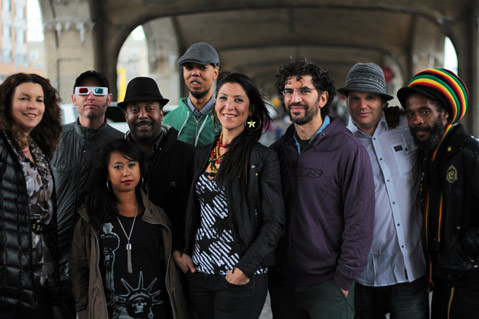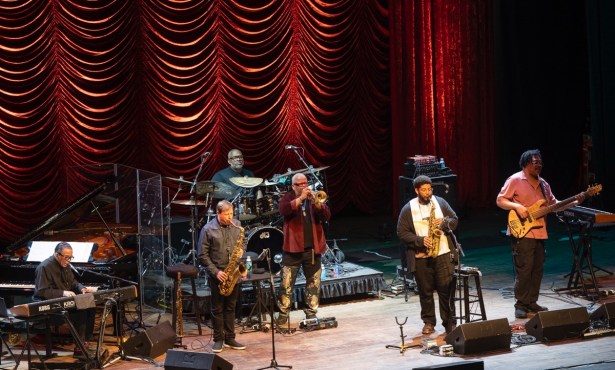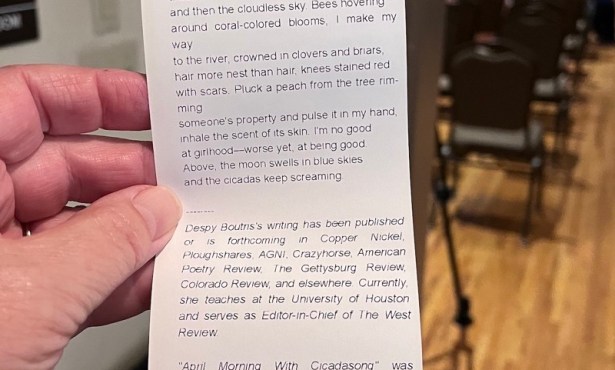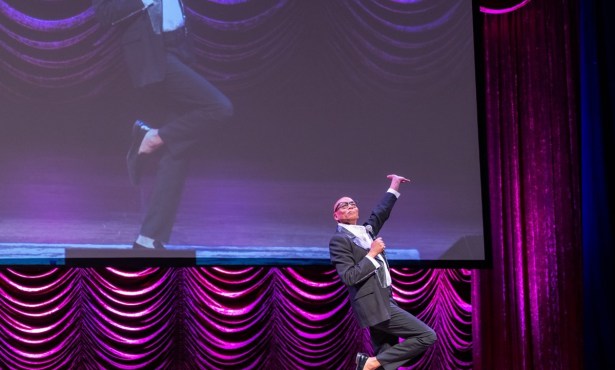Ten Years of Dub Side of the Moon
Michael Goldwasser Reminisces on a Decade of Reggae Covers

In many ways, the story of the Easy Star All-Stars can be chalked up to a happy accident. Back in 1996, and fairly unfazed by the world of classic rock, a young musician named Michael Goldwasser was coerced into reimagining Pink Floyd’s Dark Side of the Moon as a roots-reggae album. Together with Victor “Tiklah” Axelrod, the New York producer went to work. What he came away with would go on to become one of the best-selling reggae records of the decade. Together with his Easy Star All-Star team, Goldwasser would follow up Dub Side of the Moon with a series of dubby cover albums: 2006’s Radiodread, a front-to-back reggaefication of Radiohead’s OK Computer; 2009’s Beatles take, Easy Star’s Lonely Hearts Dub Band; and 2012’s Thrillah, a remake of Michael Jackson’s career-launching 1982 classic. This year, Goldwasser and the Easy Star All-Stars celebrate Dub Side of the Moon’s 10-year anniversary with a special rerelease of the album, as well as a tour featuring new and old members performing Dub Side in its entirety.
This Monday, September 22, the band heads to SOhO to celebrate. In anticipation, The Santa Barbara Independent caught up with Goldwasser over the phone from his New York City home to discuss the surprising success — and grand implications — of Dub Side’s rise.
Am I correct in thinking that Dub Side of the Moon was not actually your idea? It was definitely not my idea. [Laughs.] I wasn’t a big Pink Floyd fan. I may have heard the album in its entirety before, but it would have been in passing, like maybe at a party or something. I never sat down and listened to Dark Side of the Moon, though. As a teenager I was more into reggae, hip-hop, R&B, funk, jazz, stuff like that. Of course I heard classic rock because you couldn’t really avoid it, especially in America, but I didn’t really gravitate toward it.
How have you seen the reggae-consuming public change over the last 10 years? I’ve seen a significant change in the reggae fanbase in the U.S. in the last 10 years, and certainly in the last 20 years, because there are so many younger, homegrown reggae bands here. There are tons of kids out there who got into reggae by way of American reggae bands. It used to be if I went to a reggae festival, say here in New York, it would be mostly West Indians and most or all of the artists would be West Indian or Jamaican. I went to a festival called Cali Roots in Monterey this past May, and over the course of the weekend, there were something like 15,000 people there, and the main draw was American reggae acts. I think there were three Jamaican groups on the whole bill. I meet fans and musicians now who tell me they got into reggae by listening to Dub Side of the Moon, which blows my mind.
Looking back, which cover album presented the biggest challenge? They were all challenging in their own way. Radiodread was a pretty big challenge. On one side there were the expectations — Dub Side of the Moon sold well and it got a lot of critical acclaim, so following it up with something good came with some increased pressure. We chose OK Computer for a lot of reasons, but it is an extremely complex album, especially when it comes to time signatures. Seven out of the 12 songs on that album are not in 4/4 time at all, or they change time signatures a whole bunch of times. Almost all reggae before we did Dub Side of the Moon is in 4/4 time. I think “Paranoid Android” changes time signatures something like 13 times. Eventually I figured it out, but it was definitely a challenge to wrap my head around it. But Thrillah was a challenge just because Thriller was one of my favorite albums of all time. It was very personal to me. I wanted so badly to pay respect to that album.
That this album is still selling well and finding new fans a decade later is quite the accomplishment. Looking back, what do you take away from its success? With Dub Side of the Moon, and all the stuff I’ve produced for Easy Dub All-Stars, I think it’s proven that musical boundaries are false. Music should and very easily does transcend boundaries, as long as you allow people the freedom to accept it. There were many naysayers when we first announced that we were doing Dub Side of the Moon. Pink Floyd fans, rock fans said it was going to suck, that there was no way it was going to be good. I’d say at least 90-95 percent of the responses we got from those people proved that we changed their minds. I know that we’ve brought a lot more people into the reggae camp and introduced a lot of reggae fans to rock music. The lesson is that good music is good music, and we shouldn’t be thinking about categories. Just make music and listen to music and be free.
4·1·1
Easy Star All-Stars bring Dub Side of the Moon to SOhO Restaurant & Music Club (1221 State St.) on Monday, September 22, at 8 p.m., with openers Giant Panda Guerilla Dub Squad & Tatanka. For tickets and info, call 962-7776 or visit sohosb.com.



